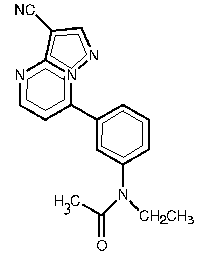JERUSALEM -- Teva Pharmaceutical Industries Ltd. (Nasdaq: TEVA) announced today that the U.S. Food and Drug Administration has granted tentative approval for the Company's ANDA for Zaleplon Capsules, 5 mg and 10 mg.
Upon final approval, Teva's Zaleplon Capsules will be the AB-rated generic equivalent of Jones Pharma Inc.'s Sonata(R) Capsules, a product indicated for short term treatment of insomnia. The brand product has annual sales of approximately $121 million.
Teva is currently in patent litigation concerning this product in the U.S. District Court for the District of New Jersey. King Pharmaceuticals brought suit against Teva in August 2005 involving Teva's paragraph IV certification to U.S. Patent No. 4,626,538.
Final approval is expected upon the earlier of a favorable decision in the case or expiry of the mandatory stay of approval in December 2007.
Teva Pharmaceutical Industries Ltd., headquartered in Israel, is among the top 20 pharmaceutical companies and among the largest generic pharmaceutical companies in the world. The company develops, manufactures and markets generic and innovative human pharmaceuticals and active pharmaceutical ingredients. Close to 90% of Teva's sales are in North America and Europe.
Safe Harbor Statement under the U.S. Private Securities Litigation Reform Act of 1995: This release contains forward-looking statements, which express the current beliefs and expectations of management. Such statements are based on management's current beliefs and expectations and involve a number of known and unknown risks and uncertainties that could cause Teva's future results, performance or achievements to differ significantly from the results, performance or achievements expressed or implied by such forward-looking statements. Important factors that could cause or contribute to such differences include whether and when the proposed acquisition of IVAX Corporation will be consummated and the terms of any conditions imposed in connection with such closing, the terms and conditions of the financing utilized by Teva for the IVAX acquisition, Teva's ability to rapidly integrate IVAX's operations and achieve expected synergies, Teva's ability to successfully develop and commercialize additional pharmaceutical products, the introduction of competitive generic products, the impact of competition from brand-name companies that sell or license their own generic products under generic trade dress and at generic prices (so called "authorized generics") or seek to delay the introduction of generic products, regulatory changes that may prevent Teva from exploiting exclusivity periods, potential liability for sales of generic products prior to a final court decision, including that relating to the generic versions of Neurontin(R) and Allegra(R), the effects of competition on Copaxone(R) sales, the impact of pharmaceutical industry regulation and pending legislation that could affect the pharmaceutical industry, the difficulty of predicting U.S. Food and Drug Administration, European Medicines Association and other regulatory authority approvals, the regulatory environment and changes in the health policies and structure of various countries, Teva's ability to successfully identify, consummate and integrate acquisitions, exposure to product liability claims, dependence on patent and other protections for innovative products, significant operations outside the United States that may be adversely affected by terrorism or major hostilities, fluctuations in currency, exchange and interest rates, operating results and other factors that are discussed in Teva's Annual Report on Form 20-F and its other filings with the U.S. Securities and Exchange Commission. Forward-looking statements speak only as of the date on which they are made and the Company undertakes no obligation to update publicly or revise any forward-looking statement, whether as a result of new information, future developments or otherwise.
COPYRIGHT 2005 Business Wire
COPYRIGHT 2005 Gale Group



